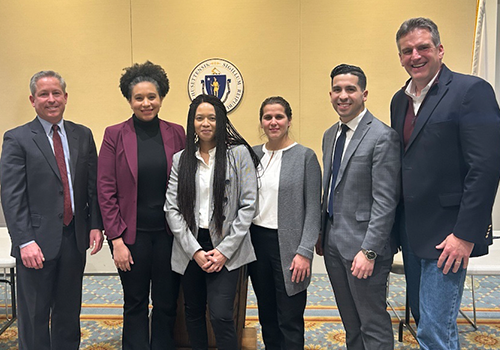News and Updates About Federal Financial Aid & the FAFSA: Students | Practitioners
News
Briefing: Universal FAFSA Policy to Promote College Access in Massachusetts
January 31, 2024

Briefing video posted at bottom of page.
MASSACHUSETTS – On January 31, members of the legislature, student-serving organizations, researchers, and students converged at the Massachusetts State House to examine the need to pass universal FAFSA legislation in Massachusetts. During this briefing hosted by uAspire, Hildreth Institute, and OneGoal, speakers highlighted successes from other states, FAFSA completion in Massachusetts, and the student experience with financial aid processes.Speakers included sponsors of House Bill 4269: Senator Jo Comerford and Representative Andy Vargas. An expert panel featured Jay Ash, president and CEO of the Massachusetts Competitive Partnership; Noah Berger, director of legislation, policy, and political action at the Massachusetts Teachers Association; Dr. Bahar Akman Imboden, managing director of the Hildreth Institute; and Amanda Seider, executive director of OneGoal Massachusetts. uAspire’s Massachusetts policy director Femi Stoltz moderated.
The event also featured student advocates Michelle Jean-Louis of Harvard College and Eraste Talla of Bunker Hill Community College and included a pre-recorded speech by John White, former commissioner of the Department of Elementary and Secondary Education of Louisiana, the first state to implement a universal FAFSA policy.
Speakers highlighted that students who complete the FAFSA by the end of their high school year are 84% more likely to enroll in college, and, in 2023, eligible Massachusetts students left $53 million of federal aid on the table because they did not fill out the FAFSA.
“By adopting a universal FAFSA completion policy—making the financial aid form a requirement for graduation and supporting students through the process—Massachusetts can help ensure students access financial aid and postsecondary opportunities,” said Michelle Jean-Louis, a student at Harvard College.
Amanda Seider, executive director of OneGoal in Massachusetts said, “It is crucial for students considering college to complete the FAFSA, and that process is made much less difficult when students have support with FAFSA completion.” Noah Berger of the Massachusetts Teachers Association highlighted that “adequately resourcing schools so they can provide needed support to students is critical” and that this legislation is “one piece of a comprehensive set of strategies to make debt-free, high-quality public higher education possible for all students”.
About the financial implications of the proposal, Dr. Bahar Akman Imboden of the Hildreth Institute said, “This initiative would cost the Commonwealth about $13 million. This funding is a strategic investment ensuring the program's effectiveness in bridging inequities in financial aid information access.” Jay Ash, CEO of the Massachusetts Competitive Partnership, added that this investment “would inevitably benefit the Commonwealth’s economy” as an increased awareness of their financial aid eligibility would prompt more students to take advantage of available aid at the state and federal levels.
The briefing was concluded by Eraste Talla, a Bunker Hill Community College student, who called on the legislature to co-sponsor the legislation to ensure that Massachusetts’s first-generation students, students from low-income communities, and students of color can access financial aid and postsecondary opportunities.
Watch the Briefing
For more information about universal FAFSA policies visit: uaspire.org/opportunities-and-challenges-of-universal-fafsa